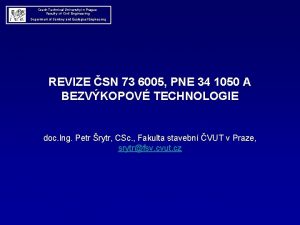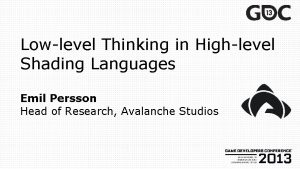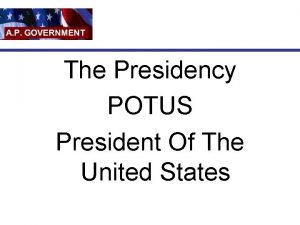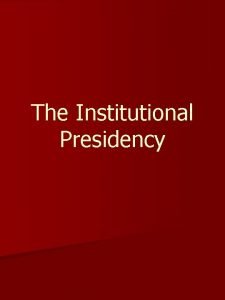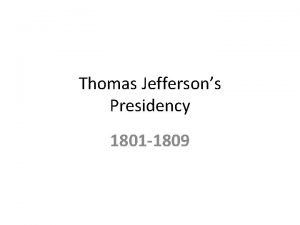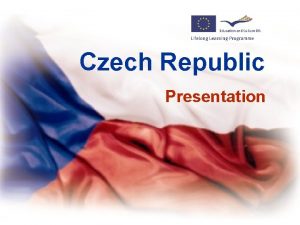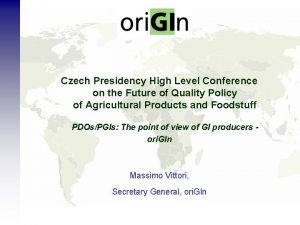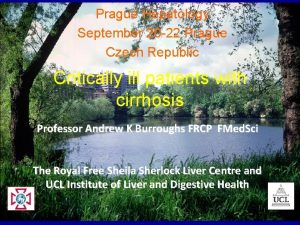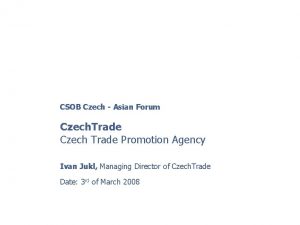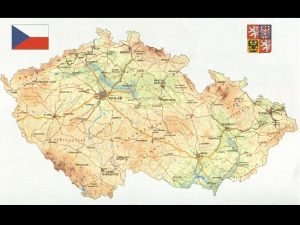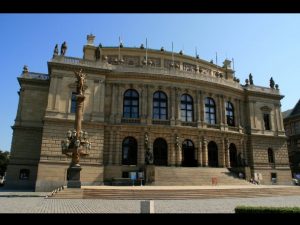CZECH PRESIDENCY high level conference Prague 12 13















- Slides: 15

CZECH PRESIDENCY high level conference Prague, 12 -13 March 2009 Workshop C: Certification Schemes and Organic Farming Single EU market in organic products Lizzie Melby Jespersen, International Centre for Research in Organic Food Systems

Green paper on agricultural product quality product standards, farming requirements and quality schemes Question 12: • What factors might inhibit the development of a single EU market in organic products? • How can the single EU market in organic products be made to work better? Definition of ”single market”: A single market is a more advanced form of the ”common market” envisioning more efforts to be geared towards removing the physical (borders), technical (standards) and fiscal (taxes) barriers among the member states to obtain as free movement of capital, labour, goods and services between the member states as within them (Wikipedia)

The single market and the Danish organic sector In 2007 -2008 ICROFS carried out for the Ministry of Food, Agriculture and Environment the study: ”Development, growth and integrity in the Danish organic sector – a knowledge synthesis on the opportunities and barriers for a continued development and market-based growth in production, processing and sale of organic products http: //www. icrofs. org/pdf/knowledge_synthesis. pdf Some market, production and consumer information based on this study will be presented.

Danish market information • The organic market share of the total food sale was almost 6 % in 2007 and has been estimated to grow to 6, 5 % in 2008. • The organic retail sale has grown considerably since 2005. From 2006 to 2007 sales went up with 33 % in money to about 483 million € and with 13 % in quantity to 210, 600 t. In 2008 a further increase of 25 % is estimated. In the same period the number of organic farmers and the organic area have experienced a decrease, but this development turned in 2007 (4 % increase). • In the period 2003 – 2007 the organic export was reasonably stable at 10 -13 % of the organic home market, while the organic import rose from 15 to 23 % of the home market. www. statistikbanken. dk

Danish foreign organic trade 2007 IMPORT In 1000 € Total EXPORT 110, 335 Total In 1000€ 63, 985 Europe 98, 599 Europe 60, 220 EU 27 95, 580 EU 27 55, 533 Netherlands 24, 875 Germany 18, 299 Italy 24, 199 UK 16, 614 Germany 18, 959 Sweden 9, 472 Sweden 8, 465 Norway 3, 283 Spain 5, 816 France 2, 153 France 3, 839 Italy 2, 079 UK 2, 482 Austria 1, 692 Czech rep. 1, 626 Czech rep. www. statistikbanken. dk 1 € = 7. 4518 DKK 91

International trends in the food area, which affect the demand for organic products: • Away from quantity towards the meaning of food • Away from good food being just tasty – good taste must also be healthy food. • Away from serving square meals towards serving ethical food From Survey by katherine O’Doherty Jensen, KU-Life in Knowledge Synthesis (Nov. 2008)

Consumer segments in Denmark divided according to their approach to ”organic” Proportion of the population • 1. The convinced 17% • 2. The brand focused 16% • 3. The positive • 4. The food focused 19% Proportion of the organic retail sale 46% 52% 19% 88% 23% 24% 8% 47% 13% • 5. The careless 11% 3% • 6. The sceptical 12% 2% Survey by katherine O’Doherty Jensen, KU-Life, 2007 SURVEY DATA 2007 + Gf. K PANELDATA 2006

Danish consumer segments’ appreciation of organic products Percent of respondents agreeing to the following being important motives for their own purchase of organic products: 1 Motive/Segment: Convinced All, %: 2 Brand 3 Positive focused 4 Product 5 Careless 6 Scepticals focused Animal welfare 78 95% 49% Better environment 74 97% 46% Avoid pesticide/ medicine residues 70 92% 43% Better quality 68 92% 42% Family’s own health 67 95% 41% Supporting organic principles 61 95% Better taste 55 78% Survey by katherine O’Doherty Jensen, KU-Life, 2007 21% 30%

% of 6 consumer segments, which agree in the following statements on food incl. organic food production Average Convinced Brand focused Positive Product focused Careless Scepticals Prefer Danish conv. products to foreign organic products 46 53 54 47 41 36 39 Important to support Danish farmers 78 88 84 80 75 69 67 Prefer Danish producers compared to foreign producers 70 85 77 74 65 60 54 Organic farmers more engaged in their production 63 88 85 71 46 35 40 Organic farmers more concerned about the state of the Earth 62 89 76 76 43 46 36 Like fair trade products 45 79 52 60 32 31 15 Prefer small producers to large 38 64 44 42 25 22 28 Worry about energy consumption for production and transport of food 18 33 21 14 15 14 9 Survey by katherine O’Doherty Jensen, KU-Life, 2007

Consumer trust in organic products is a way to reduce complexity in food choices Factors that might inhibit the development of the single market in organic products • ”Logo” confusion of the consumers • Loss of consumer confidence • Imbalance between supply and demand • Lack of integrity in relation to the organic principles and lack of continuous development and improvement of the organic standards and production methods

LOGO confusion • The many logos of organic certifiers and other standard owners and the many organic “retailer brands” may confuse the consumers – especially in importing countries. The new compulsory EU logo may make up for that if it becomes generally recognized by the consumers in the EU. Combined with the “name of the country” for products, where all raw materials (98%) have been farmed in that country (Art. 24. 1 c) the EU logo gives good consumer information – also for consumers who want to buy local organic food products. • Green paper suggests to introduce 3 more quality labels of which one is an extension of the Ecolabel scheme to processed agricultural products. This is in conflict with Art 23. 1 & 23. 2 of EC 834/2007 reserving “bio” and “eco” to organic feed and food products. Conflicting labelling should be avoided Requirements of the Ecolabel scheme should instead be introduced over time in the organic EU Commission regulation, EC No. 889/2008.

Loss of consumer confidence ”Organic” fraud cases in one country may seriously affect the confidence of the consumers all over Europe. COMMISSION and GOVERNMENTS: • Provide for better supervision, communication and control in the certification system plus re-introduce country audits and implement cross control checks on the basis of risk assessment. • Introduce more transparency in the control – publication of country control reports on the web. • Make stakeholder consultations and cooperate with the whole organic certification chain THE ORGANIC CERTIFIERS, THE ORGANIC MOVEMENT and RESEARCH: • The “Anti Fraud Initiative” of organic traders was formed in 2007 http: //www. gfrs. de/riskmanagement/projects/afi 2/ - code of good practices for organic traders and processors • The European Organic Certifiers Council (EOCC) www. eocc. nu – 28 inspection bodies and 12 observes work for transparency and improved communication on e. g. fraud. • FP 7 project, Economic Analysis of Certification Systems for Organic Food and Farming www. certcost. org, 2008 -2010, 10 partners from 7 countries, Coordinator, Prof. Stephan Dabbert, Universität Hohenheim, DE. Objective: To provide recommendations to improve the organic food certification systems in Europe in terms of efficiency, transparency and cost effectiveness.

Imbalance between supply and demand Too low demand: • The higher price of organic products may make the consumers buy cheaper conventional product especially in a period with recession. Too low supply • Increasingly difficult to persuade farmers to convert to organic, and return of organic farmers to conventional farming. Norwegian study (Lien et al. 2008) listed main reasons for that as: too much certification and control bureaucracy, too low subsidies, unpredictable political framework for organic agriculture and too low premium price compared to the efforts – in particular the small farmers gave up. http: //www. nilf. no/Forsiden/Bm/2008/S 20080731 -Okologisk. shtml COMMISSION and GOVERNMENTS • Allocate some of the Rural Development Funding to organic production in relation to the multiple benefits of organic farming. Danish figures show that the Government earns 35 million € in extra VAT due to the higher prices of organic products, and this is more than is spent on support of organic production and research (Oekologisk Jordbrug, 23. 01. 2009). • Support promotion campaign for organic products to create a more stable market. • Reduce administration and control bureaucracy – especially for the small farmers. • All actors in the organic certification chain should work to implement the recommendations of the UNCTAD/FAO/IFOAM task force on harmonization and equivalence in organic agriculture http: //www. unctad. org/trade_env/ITForganic/material 1. asp ORGANIC CERTIFIERS, MOVEMENT and RESEARCH • International collaboration and communication on methods to promote organic farming and reduce administrative burdens and costs of certification

Loss of integrity and lack of standards development • • Risk of ”conventionalisation” /industrialisation of organic production in a single market. Lack of or too slow development of standards in relation to resource consumption, climate change, CO 2 emission, fair trade etc. compared to conventional production. COMMISSION and GOVERNMENTS: • Make stakeholder consultation and dialogue on organic principles and standards development. • Provide for flexibility in the EU regulation to improve and develop new and stricter standards in relevant areas – also for public standards owners • Evaluate and update the European Organic Action plan in collaboration with stakeholders. • Fund research to support the development of organic standards and policies for the benefit of the environment, biodiversity, rural development etc. ORGANIC MOVEMENT and CERTIFIERS • Continue the debate on organic integrity and principles in relation to industrialisation, rural development, climate change and other relevant issues not yet covered by the organic regulations and standards • Develop private organic standards on the uncovered issues and feed into the EU and Governement consultations on these issues

There are no quick and easy solutions to the single market problems! We shall have to evolve problem solvers galore – since each problem we solve creates ten problems more Piet Hein, Short Gruks 1968 this is what makes it so fascinating to work with ”organic” Thank you for your attention!
 Faculty of civil engineering ctu prague
Faculty of civil engineering ctu prague Czech technical university in prague civil engineering
Czech technical university in prague civil engineering Rcp hlsl
Rcp hlsl Presidency line of succession
Presidency line of succession Institutional presidency definition
Institutional presidency definition Chapter 20 section 2 the harding presidency
Chapter 20 section 2 the harding presidency Chapter 14 the presidency in action answer key
Chapter 14 the presidency in action answer key Alien and sedition acts summary
Alien and sedition acts summary Washingtons presidency
Washingtons presidency Chapter 6 section 1 the presidency
Chapter 6 section 1 the presidency Ch 12 section 2 the harding presidency
Ch 12 section 2 the harding presidency George washingtons presidency
George washingtons presidency Constructionist presidency
Constructionist presidency Apush chapter 7 hammering out a federal republic
Apush chapter 7 hammering out a federal republic President's formal and informal powers
President's formal and informal powers Thomas jeffersons presidency
Thomas jeffersons presidency

